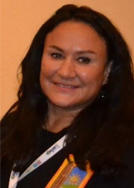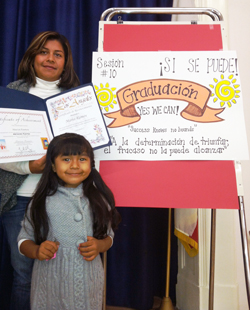The Harvard Family Research Project separated from the Harvard Graduate School of Education to become the Global Family Research Project as of January 1, 2017. It is no longer affiliated with Harvard University.

|
September 17, 2013 Parents as Agents of ChangeSandra Gutierrez
|
Related Resources
Parenting Classes for Latino Families Show Promise in Closing Achievement Gap
This EdSource article provides an overview of the Abriendo Puertas program and highlights the ways in which it helps Latino families support their children’s school readiness.
Latino Families: Getting Involved in Your Children’s Education
This Early Childhood Digest, offered in both English and Spanish, provides guidance for Latino families and schools on how they can work together to help young children learn and grow.
FINE Newsletter, Volume V, Issue 3
Issue Topic: Creating a Culture of Continuous Improvement
Leading the Field
Sandra Gutierrez is the national director of Abriendo Puertas/Opening Doors, an evaluated program developed by and for Latino parents of young children to address opportunity gaps. In this Leading the Field profile, Ms. Gutierrez shares her vision of how families are fundamental to transforming the lives of our children and our communities. [Este artículo también está disponible en español como Padres de Familia como Agentes de Cambio.]
MY VISION FOR THE FAMILY ENGAGEMENT FIELD
I have a vision that engaging families will help close the “opportunity gap” that prevents many children from realizing their fullest potential educationally and professionally. Some people use the term “achievement gap,” but an achievement gap is merely the result of the real problem—an opportunity gap, as seen in the unequal access to high-quality schools and critical health and support services. Children—particularly those from low-income families—who lack access to these services often do not have the same opportunities for success as other children who have access to them. As leaders of their families, parents, whether single or married, along with others who head families, can be powerful agents of change, yet they are often an underutilized resource in efforts to close the opportunity gap.
MY CURRENT EFFORTS TO ADVANCE THIS VISION
“Tell me and I will forget. Show me and I will remember. Involve me and I will make it mine.”—Chinese Proverb
One way to engage and empower parents in order to help close the opportunity gap is through “popular education,” an approach used with adult learners throughout Latin America. This teaching and learning method—translated from the Spanish educación popular—means “of the people” and is designed to address a wide range of personal, economic, and social justice concerns of lower-income and working-class people. Popular education draws on community and cultural values, as well as popular culture, so that the content is accessible and meaningful in parents’ everyday lives.
The program I direct, Abriendo Puertas/Opening Doors, is designed to strengthen the leadership and advocacy skills of Latino parents with children ages 0 to 5 so these parents can help narrow the opportunity gap before children begin formal schooling. The curriculum is based on popular education and draws on the real-life experiences of participants. Through popular education, participants in Abriendo Puertas build connections among their everyday life experiences, larger social issues that concern them, and actions they decide to take that will yield positive consequences for their families.
 |
|
A parent graduate poses with her daughter during a graduation ceremony for the Abriendo Puertas/Opening Doors program |
In our program, we often hear parents say, “Más vale prevenir que lamenter” [It’s better to prevent than to lament]. Every week, Latino parents meet in a support-group setting to strengthen their capacity to be their children’s first and most influential teacher and to make their home their children’s first school, rich with everyday learning experiences. Discussion topics include goal setting, communication, ages and stages of development, promoting literacy, choosing preschool and health care services, nutrition, socioemotional wellness, and advocating for children, families, and communities. These group sessions include activities such as popular games like Abriendo Puertas Loteria (Bingo), as well as references to dichos, or cultural sayings, to reinforce key messages in ways that are engaging and relatable to families.
Parents’ confidence increases when they recognize the power they have as leaders of their families and the extent to which all of their daily decisions profoundly influence the arc of their children’s lives. One important way that parents in our program are able to exercise this influence is to help close the opportunity gap by advocating for excellence in chronically underperforming local schools where, too often, their children receive an inferior education. Our sharing key data with parents is an essential step to increase their capacity for effective advocacy.
Because one cannot change what one does not know, a cornerstone of popular education—as well as of the Abriendo Puertas program—is the importance of sharing local data with parents to inform them about their local schools. These data include National Assessment of Educational Progress scores and rates of literacy, graduation, and obesity within the community, along with information and activities that parents can use to take positive actions every day in support of their children’s healthy development and education. If parents learn that close to 50 percent of neighborhood children are not reading at grade level in third grade—making it four times more likely that these children will drop out of high school—they are compelled to act to help address this problem. No parent wants their child to be one of the negative statistics; informed parents are powerful agents of change in closing the opportunity gap.
The family engagement field as a whole is energized and growing, and as economic disparities continue to mount, family engagement has become increasingly important in helping to address the opportunity gap. Family engagement efforts have broadened from encouraging parents to feed their children healthy food and attend teacher meetings to investing in the power of parents as leaders of their families and as agents of change in their communities. There are many promising and far-reaching efforts that will help to close the opportunity gap and advance family engagement, including the following:
- The president is calling for universal preschool as well as an expansion of home visitation programs, which, if enacted, will create needed educational opportunities and could help encourage more parents to become involved in their children’s education from the time their children are very young.
- There is increasing national attention on and public support for “two-generational” approaches that focus on the needs of both vulnerable children and their parents. The Aspen Institute Ascend Fund is supporting cross-sector projects that create a cycle of opportunity for children and their parents.
- The Campaign for Grade-Level Reading is investing in parents as key partners to address third-grade reading levels, early literacy, summer learning, and attendance issues.
- Many national early childhood advocacy groups, as well as Abriendo Puertas, are evolving from a birth-to-5 to a birth-to-8 agenda, which will extend parents’ access to critical information about their children’s development and educational outcomes, such as information about children’s literacy development.
- The W. K. Kellogg Foundation convened a national community of practice, “Family Engagement: A Shared Responsibility Among Families, Schools, and Communities,” to highlight stellar community-based two-generation work, share best practices to enhance the field, and advance racial equity as a priority in family engagement efforts.
- The U.S. Department of Education is developing a framework for family engagement that promotes parents as partners in improving education.
CHANGES STILL NEEDED TO HELP ENABLE THIS VISION
If, as we so often say, “children are our future,” we must address the effects of the current economic downturn on families and work with them to help overcome the opportunity gap. Poverty is a key factor in the opportunity gap and is devastating to children’s development. According to the National Center for Children in Poverty, fully one-quarter of children in the U.S. under the age of 6—6 million children—live in poor families. All of us working with families are challenged to reexamine our assumptions and attitudes about families facing poverty. Family engagement can be part of the much-needed national conversation about addressing the problem of poverty and the problems that stem from it, such as the opportunity gap.
Educational institutions that train preservice teachers and social workers, as well as professionals who provide in-service training to school and other family-facing staff, must offer more professional development on best practices for those working with diverse families and families whose primary language is not English. Understanding the dramatically changing demographics in the United States is paramount: Soon the majority of our country’s children will be non-White. The opportunity gap is not something that affects only those living in certain zip codes—it affects all of us. If we want our country to prosper, we must invest in all of our children. And by learning more about who our children are and what they need in order to succeed, we can make informed decisions on how best to engage their families in creating the future we seek and will share.
It’s also important that we move education research off the shelves of academics and into the hands of parents to help them understand what they can do to help their children. Ideally, education researchers would present their published findings in a way that parents could understand them and act on the information to promote their child’s learning and well-being. Those who work with or serve families, such as program directors, teachers, or family service workers, can also help by translating research findings into tools and practical tips that families can use with their children. These efforts will help build parents’ capacity to transform the lives of their children as well as their communities.
Finally, it is important to think beyond what our family- and child-serving agencies and programs already do. We must elevate our view of family engagement from something that is essential to a quality education and student success to something that positions family empowerment and advocacy as a key contributor to the health and progress of our beloved country. Imagine, for a moment, what our children’s future would be if we had a parent-friendly, strength- and evidence-based, sustainable system of family engagement that helped close the opportunity gap and ensure that all children have what they need to succeed.
Click here to access other articles and resources in this FINE Newsletter, "Creating a Culture of Continuous Improvement."
This resource is part of the September 2013 FINE Newsletter. The FINE Newsletter shares the newest and best family involvement research and resources from Harvard Family Research Project and other field leaders. To access the archives of past issues, please visit www.hfrp.org/FINENewsletter.
